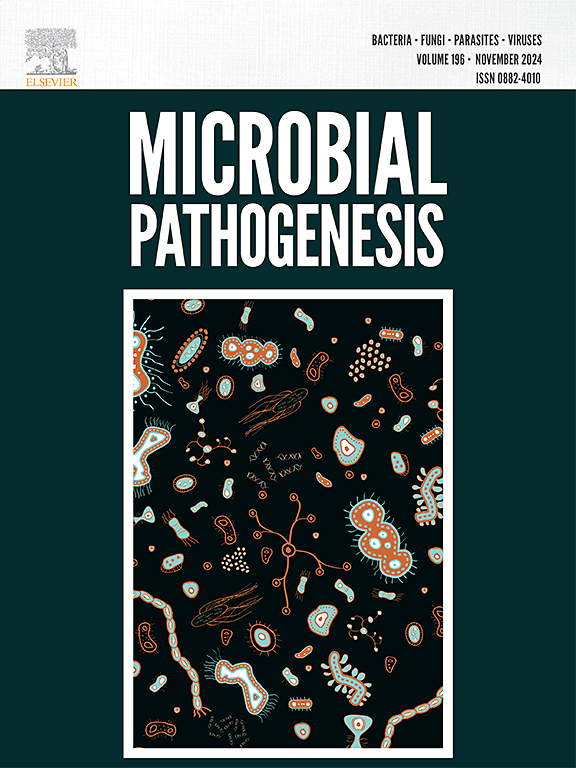Phage therapy: A targeted approach to overcoming antibiotic resistance
IF 3.3
3区 医学
Q3 IMMUNOLOGY
引用次数: 0
Abstract
The rise of antibiotic-resistant bacterial infections has become a significant global health threat, necessitating the need for alternative therapeutic strategies. The use of bacteriophages—viruses that particularly infect and lyse bacteria—in phage therapy has resurfaced as a potentially effective substitute for conventional antibiotics. This narrative review aims to explore the mechanisms, applications, challenges, and prospects of phage therapy in combating antibiotic-resistant infections. A thorough analysis of the literature was carried out by exploring online databases, such as Google Scholar, PubMed, Scopus, and Web of Science. The search focused on peer-reviewed articles, clinical trials, and authoritative reports published in the last 10 years. The review synthesized findings from studies on phage mechanisms, therapeutic applications, regulatory challenges, and advances in phage engineering. Phage therapy demonstrates several advantages over antibiotics, including high specificity for target bacteria, the ability to penetrate biofilms, and a lower propensity for resistance development. However, significant challenges remain, such as regulatory and production hurdles, the potential for phage resistance, and interactions with the host immune system. Advances in genetic engineering have enhanced the therapeutic potential of phages, and personalized phage therapy is emerging as a viable approach for tailored treatments. Phage therapy holds significant promise as an alternative to antibiotics, particularly in the fight against antibiotic-resistant bacteria. While challenges persist, ongoing research, technological advancements, and collaborative efforts are crucial for integrating phage therapy into mainstream clinical practice, potentially revolutionizing the treatment of bacterial infections and addressing the global antibiotic resistance crisis.
噬菌体疗法:克服抗生素耐药性的靶向方法。
抗生素耐药细菌感染的增加已成为全球健康的重大威胁,因此需要替代治疗策略。在噬菌体疗法中使用噬菌体--特别是能感染和裂解细菌的病毒--作为传统抗生素的潜在有效替代品再次兴起。这篇叙述性综述旨在探讨噬菌体疗法在对抗抗生素耐药性感染方面的机制、应用、挑战和前景。通过搜索 Google Scholar、PubMed、Scopus 和 Web of Science 等在线数据库,对文献进行了全面分析。搜索的重点是过去 10 年发表的同行评议文章、临床试验和权威报告。该综述综合了有关噬菌体机制、治疗应用、监管挑战和噬菌体工程进展的研究结果。与抗生素相比,噬菌体疗法具有多项优势,包括对目标细菌的高度特异性、穿透生物膜的能力以及较低的抗药性产生倾向。然而,噬菌体疗法仍面临重大挑战,如监管和生产障碍、噬菌体产生抗药性的可能性以及与宿主免疫系统的相互作用。基因工程的进步增强了噬菌体的治疗潜力,个性化噬菌体疗法正在成为一种量身定制治疗的可行方法。噬菌体疗法有望成为抗生素的替代疗法,尤其是在抗击耐抗生素细菌方面。虽然挑战依然存在,但持续的研究、技术进步和合作努力对于将噬菌体疗法纳入主流临床实践至关重要,这有可能彻底改变细菌感染的治疗方法,并解决全球抗生素耐药性危机。
本文章由计算机程序翻译,如有差异,请以英文原文为准。
求助全文
约1分钟内获得全文
求助全文
来源期刊

Microbial pathogenesis
医学-免疫学
CiteScore
7.40
自引率
2.60%
发文量
472
审稿时长
56 days
期刊介绍:
Microbial Pathogenesis publishes original contributions and reviews about the molecular and cellular mechanisms of infectious diseases. It covers microbiology, host-pathogen interaction and immunology related to infectious agents, including bacteria, fungi, viruses and protozoa. It also accepts papers in the field of clinical microbiology, with the exception of case reports.
Research Areas Include:
-Pathogenesis
-Virulence factors
-Host susceptibility or resistance
-Immune mechanisms
-Identification, cloning and sequencing of relevant genes
-Genetic studies
-Viruses, prokaryotic organisms and protozoa
-Microbiota
-Systems biology related to infectious diseases
-Targets for vaccine design (pre-clinical studies)
 求助内容:
求助内容: 应助结果提醒方式:
应助结果提醒方式:


